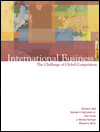 |  International Business : The Challenge of Global Competition, 8/e Donald Ball
Wendell H. McCulloch,
California State University Long Beach
Paul L. Frantz,
California State University Long Beach
Michael Geringer,
California Polytechnic State University
Michael S. Minor,
University of Texas Pan American
Financial Management
Internet AssignmentsStudents: Included here are some internet/case assignments that you can use to review
or that your instructor may give as assignments. Your instructors have been
given the answers to these questions and may choose to give them out to you
or not.
This case is designed to:
- Provide additional information about hedging;
- Expose you to an actual hedging scenario; and
- Place you in a decision-making role regarding whether to accept a contract
from a foreign supplier that transfers the transaction risk to the US company.
You are the financial manager for Sellectro, a medium sized electronics firm
that is located in the US. Sellectro purchases electronic components from foreign
suppliers. In the past, Sellectro has been successful in negotiating contracts
that require the foreign suppliers to accept US dollars as payment for the electronic
components. However, because of the expanded opportunities in selling electronic
components that the Internet is providing, your suppliers are now less willing
to enter into contracts that expose them to transaction risk. Your purchasing
manager comes to you with a proposed contract from your major supplier, Yoshuro,
Ltd., a Japanese firm. The contract is for the purchase of 10,000 electronic
component costing ¥ 4,790 each, with payment due in three months. In the past,
a typical contract price for the purchase of 10,000 component parts from Yoshuro,
Ltd., would be $40. Your purchasing manager tells you that Yoshuro is not willing
to negotiate on the price. Therefore the decision is to either accept the contract
or to look elsewhere.
Sellectro values its business relationship with Yoshuro. It has been consistently
pleased with the prompt delivery from Yoshuro and with the quality of the electronic
components that are supplied. Therefore, you feel that it is in the best interest
of Sellectro to accommodate the contract terms if possible. You also realize,
however, that the profit margin on your finished products is relatively small.
Sellectro could accommodate a maximum price of $42 on the electronic components.
As financial manager, the ultimate decision is yours.
To help in making your decision, you begin with information from the Federal
Reserve Bank of New York website http://www.ny.frb.org/pihome/statistics/forex10.shtml
. However, you know that there are additional sites that could be equally useful.
Case Instructions:
Answer the following questions:
- What is the US dollar equivalent of the contract price of ¥ 4,790?
- If you accepted the contract price, you could protect Sellectro from the
transaction risk by entering into a forward exchange contract to purchase
the Yen in three months. If you did this, what would be the three-month forward
rate?
- With the forward rate that you determined in #2, what would be the US dollar
equivalent of ¥ 4,790 in three-months?
- Given all of the above information, would you accept the contract from Yoshuro,
Ltd.? Why or why not.
|
|




 2002 McGraw-Hill Higher Education
2002 McGraw-Hill Higher Education